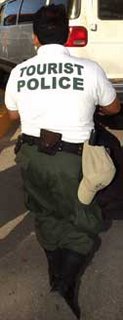
‘Tourist police’ patrol streets in Algodones
BY BLAKE SCHMIDT, SUN STAFF WRITER
LOS ALGODONES, Baja
Across the side of the vehicle "TOURIST POLICE" is emblazoned in big-block letters.
Gomez is one of 10 bilingual officers that this border town now has to protect and serve tourists.
"We're here to orientate the American citizens that come, and sometimes we help them with their problems," Gomez said.
Gomez started working as a full-time tourist police officer last month.
Since then, he's fielded price-gouging complaints from tourists, arrested overly-aggressive vendors and called an ambulance for a senior who hadn't taken her medicine.
But most of the time, he's more of a tour guide, he said.
_____
Agents use spikes to stop, apprehend drug-smugglers
BY BLAKE SCHMIDT, SUN STAFF WRITER
Border Patrol agents used spikes to pop the tires of a pickup truck that crossed the border illegally with nearly 1,000 pounds of pot early Monday morning, according to a Border Patrol news release.
Shortly after
Further up the dirt trail on which the truck was traveling, agents deployed a spike strip, or a controlled tire deflation device. The truck ran over the strip, flattening all but one tire.
Four illegal aliens from
_____
Border Patrol chase ends in crash, six sent to YRMC
BY BLAKE SCHMIDT, SUN STAFF WRITER
A
It was the second smuggling vehicle chase that ended in
"There's been a large number of smugglers fleeing, trying to use the cover of the city to evade apprehension," said Border Patrol spokesman Michael Gramley.
It was at least the sixth time since August that suspected smugglers trying to avoid Border Patrol agents have caused vehicle crashes in
_____
Newspaper: Mexican military crossed into U.S. 216 times since '96
Associated Press
ONTARIO, Calif. - Members of the Mexican military have crossed into the United States more than 200 times during the past nine years, according to a newspaper report, including 63 times in the Border Patrol's Tucson or Yuma sectors.
The Inland Valley Daily Bulletin reported that there have been 216 incursions by Mexican soldiers since 1996, citing a Department of Homeland Security document the paper obtained.
Homeland Security spokeswoman Kristi Clemens told the newspaper in a story published Sunday that the department is "determined to gain control of the border and will continue to collaborate with our partners on the border." She would not confirm the number of crossings.
_____
Bill would slap crime of trespass on illegal entrants
By Howard Fischer
CAPITOL MEDIA SERVICES
PHOENIX — A Paradise Valley Republican thinks she's found a way to let state and local police round up illegal entrants — make their presence in this state the crime of trespass.
Sen. Barbara Leff said her legislation would finally give police the legal tools they need to stop, question and arrest or deport those who cross the border illegally.
She also has companion measures to give $75 million to border counties for more officers, prosecutors and judges, and another $70 million to build and operate more prisons for all the people who will be arrested.
Leff said the goal is to help apprehend those people who are not stopped by the Border Patrol. "It would give us a second line of defense."
_____
KNIGHT RIDDER NEWSPAPERS
In a five-page statement summarizing U.S.-Mexican cooperation, Garza rejected critics' comparisons of a proposed border fence extension to the Berlin Wall and dismissed the idea that illegal immigrants have a right to seek employment in other countries.
"There is no human right to enter another country in violation of its laws," Garza wrote. "Illegal immigration is a threat to our system of laws and an affront to the millions around the world, including in
_____
Violent deaths of women rise despite effort
Louie Gilot
El Paso Times
JUAREZ -- Fifteen months after the new Chihuahua governor, José Reyes Baeza, took office, Juárez police have received forensic training by international experts, set up an Amber Alert system for missing women and children and are patrolling industrial zones where many young women work.
However, the number of women murdered in Juárez increased from 18 in 2004 to 31 in 2005. Eight of last year's victims were sexually assaulted. The figures come from the special federal commissioner for the prevention of violence against women in Juárez. The state police, in charge of homicide investigations, has yet to release crime statistics.
_____
New California state law bans many Mexican brands
By Pablo Jaime Sainz
UNION-TRIBUNE
A state law went into effect Jan. 1 that bans the sale of chile-and tamarind-based candies, most of them made in Mexico, that contain high levels of lead.
Lead-tainted candy is a major health threat to children under 6 in

0 Comments:
Post a Comment
<< Home